Chapter VI - New course in foreign policy
Stojadinovic realized that his country can no longer rely on week western democracies in foreign policy. Yugoslavia still didn't recognize Soviet Union, so cooperation on that front is still impossible. Since Little Entente broke apart, Yugoslavia only had one choice - direct cooperation with the "Axis". On October 20th, Stojadinovic gave a speech in the new parliament building in Belgrade. He said that Yugoslavia is a peaceful country, that doesn't seek any territorial expansion, or has any kind of pretensions on any of her neighbors. However, Yugoslavia must also be conscious of current political climate. Old Versailles order is collapsing. Hitler marched into Rhineland and created the Wehrmacht with only mild protests from Britain and France, which clearly shows their weakness and inability to react. Yugoslavia doesn't want to get into another world conflict, it doesn't want to become a part of world in flames. Serbia gave more then a million lives in the Great War just to avoid such a thing. Yugoslavia will work towards peace, but will be always ready for war!
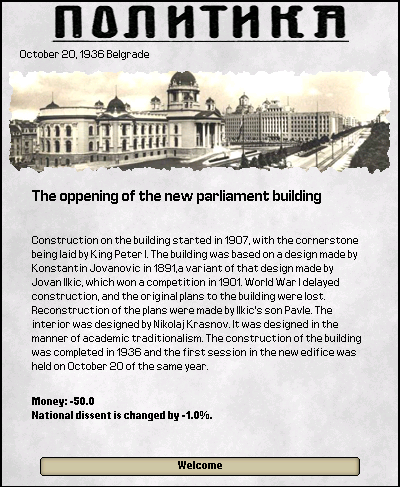
Already in 1936 Stojadinovic was making a sharp turn in Yugoslav foreign policy. Policy of reaproachment with former enemies and thus securing Yugoslav position gave its first results on January 7th 1937. On Orthodox Christmas Yugoslavia and Bulgaria signed the "pact of eternal friendship" between the two countries, thus securing the eastern flank for Yugoslavia, and freezing the Old Serbia (Vardar Macedonia) question. This treaty significantly weakened the Balkan Pact, and was marking its end.
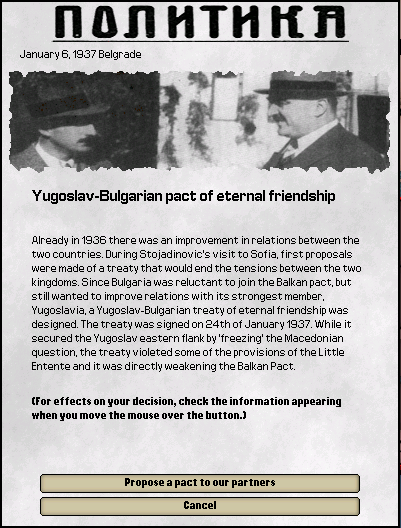
Milan Stojadinovic successfully pursued new political course of Yugoslavia. Another treaty was signed already in mid February, this time between Yugoslavia and Italy. Stojadinovic met Mussolini in Rome, and talked about current political situation on Balkans. Two countries signed several trade agreements and a friendship treaty, but several clauses of the treaty were left out. They will be revealed later, and were usually related to Albanian question. The treaty also solved all of territorial disputes, and made room for future cooperation of the two countries.
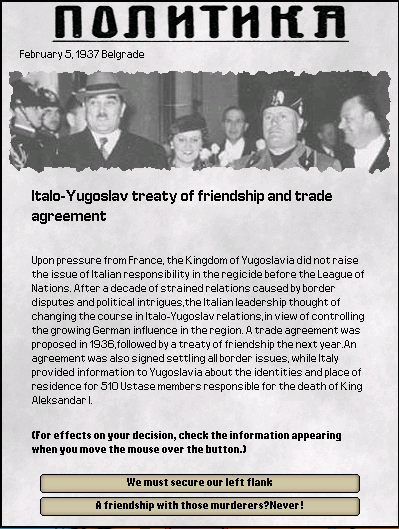
Still, after the recent successes in foreign policy, another crisis shook Yugoslavia. The Concordat with the Holy Seat was signed by Yugoslav Minister Ljudevit Gauer. However, Serbian population was firmly against any privileges to the Catholic Church, and Serbian Orthodox Church was firmly protesting about it, even declaring that anyone who votes for it in the parliament will be excommunicated from the Church. Violent clashes on the streets of Belgrade finally made Stojadinovic to stop pursuing the Concordat and restabilize relations with the Patriarch Varnava and the Serbian Orthodox Church.
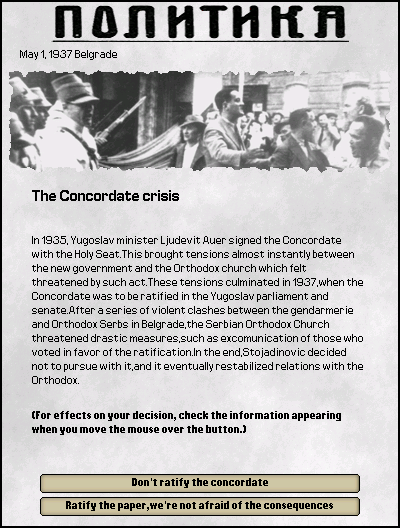
January 1st 1938 was the official end of the Little Entente. After 2 years of bad relations between the Entente countries it was obvious that Yugoslavia on one side, and Czechoslovakia and Romania on the other, had different vision of the alliance. Yugoslavia only saw the alliance as a way to contain Hungary, while Czechoslovakia and Romania wanted a full defensive alliance, and stronger cooperation with the USSR. This was unacceptable to Yugoslavia, which didn't want to risk a war with the Axis, if it isn't completely necessary. Even more, Yugoslavia saw that the alliance by itself wound stand a chance against Germany, and after clear lack of support from the western democracies, it was obvious that the alliance had no purpose anymore, especially since Yugoslav politics of reaproachment was targeted on Hungary (with whom Yugoslavia already had several treaties).
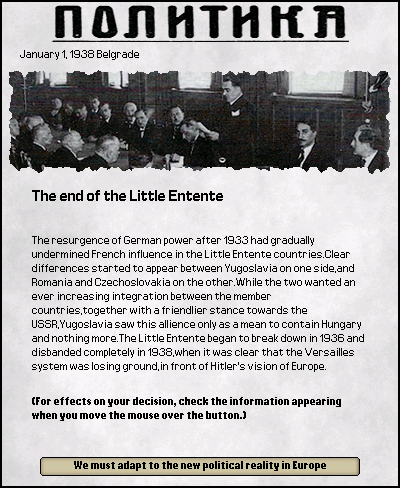
As a grand finale to Stojadinovics reaproachment policy was his visit to Adolf Hitler, Chancelor of Germany, on February 15th. Stojadinovic used his visit very well, gaining Hitlers support for his plans, and giving Hitler promise that Yugoslavia will not interfere with the Anschluss. Stojadinovic also confirmed his previous agreements with Italy, finalizing support for his long term plans...It was now clear for Stojadinovic...Yugoslavia will be no more...
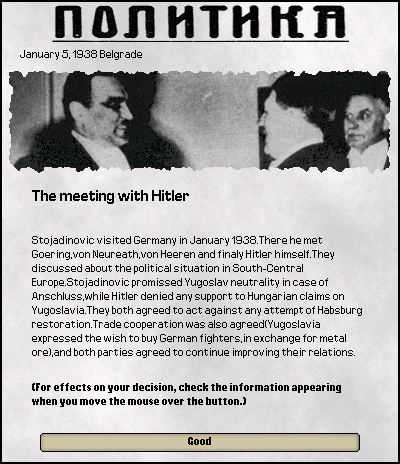
Stojadinovic realized that his country can no longer rely on week western democracies in foreign policy. Yugoslavia still didn't recognize Soviet Union, so cooperation on that front is still impossible. Since Little Entente broke apart, Yugoslavia only had one choice - direct cooperation with the "Axis". On October 20th, Stojadinovic gave a speech in the new parliament building in Belgrade. He said that Yugoslavia is a peaceful country, that doesn't seek any territorial expansion, or has any kind of pretensions on any of her neighbors. However, Yugoslavia must also be conscious of current political climate. Old Versailles order is collapsing. Hitler marched into Rhineland and created the Wehrmacht with only mild protests from Britain and France, which clearly shows their weakness and inability to react. Yugoslavia doesn't want to get into another world conflict, it doesn't want to become a part of world in flames. Serbia gave more then a million lives in the Great War just to avoid such a thing. Yugoslavia will work towards peace, but will be always ready for war!

Already in 1936 Stojadinovic was making a sharp turn in Yugoslav foreign policy. Policy of reaproachment with former enemies and thus securing Yugoslav position gave its first results on January 7th 1937. On Orthodox Christmas Yugoslavia and Bulgaria signed the "pact of eternal friendship" between the two countries, thus securing the eastern flank for Yugoslavia, and freezing the Old Serbia (Vardar Macedonia) question. This treaty significantly weakened the Balkan Pact, and was marking its end.

Milan Stojadinovic successfully pursued new political course of Yugoslavia. Another treaty was signed already in mid February, this time between Yugoslavia and Italy. Stojadinovic met Mussolini in Rome, and talked about current political situation on Balkans. Two countries signed several trade agreements and a friendship treaty, but several clauses of the treaty were left out. They will be revealed later, and were usually related to Albanian question. The treaty also solved all of territorial disputes, and made room for future cooperation of the two countries.

Still, after the recent successes in foreign policy, another crisis shook Yugoslavia. The Concordat with the Holy Seat was signed by Yugoslav Minister Ljudevit Gauer. However, Serbian population was firmly against any privileges to the Catholic Church, and Serbian Orthodox Church was firmly protesting about it, even declaring that anyone who votes for it in the parliament will be excommunicated from the Church. Violent clashes on the streets of Belgrade finally made Stojadinovic to stop pursuing the Concordat and restabilize relations with the Patriarch Varnava and the Serbian Orthodox Church.

January 1st 1938 was the official end of the Little Entente. After 2 years of bad relations between the Entente countries it was obvious that Yugoslavia on one side, and Czechoslovakia and Romania on the other, had different vision of the alliance. Yugoslavia only saw the alliance as a way to contain Hungary, while Czechoslovakia and Romania wanted a full defensive alliance, and stronger cooperation with the USSR. This was unacceptable to Yugoslavia, which didn't want to risk a war with the Axis, if it isn't completely necessary. Even more, Yugoslavia saw that the alliance by itself wound stand a chance against Germany, and after clear lack of support from the western democracies, it was obvious that the alliance had no purpose anymore, especially since Yugoslav politics of reaproachment was targeted on Hungary (with whom Yugoslavia already had several treaties).

As a grand finale to Stojadinovics reaproachment policy was his visit to Adolf Hitler, Chancelor of Germany, on February 15th. Stojadinovic used his visit very well, gaining Hitlers support for his plans, and giving Hitler promise that Yugoslavia will not interfere with the Anschluss. Stojadinovic also confirmed his previous agreements with Italy, finalizing support for his long term plans...It was now clear for Stojadinovic...Yugoslavia will be no more...


